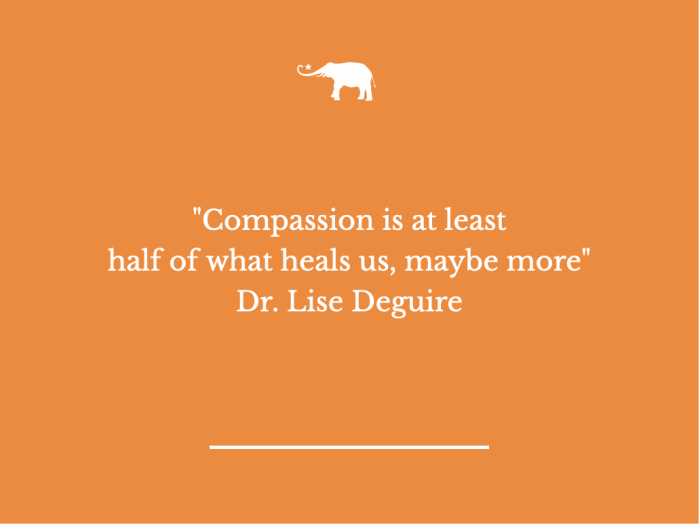I have been a patient and a doctor, on both sides of the bed. As a psychologist, I have sat with injured people, helping them through their trauma. I have also been the wounded patient, talking to a therapist about being burned as a child. This duality is both my burden and my strength.
I have been bored and exhausted, slogging through the last appointment of the day. I experience exasperation with clients who laze through sessions, neglecting the homework I carefully assigned. I have bitten my tongue, or regrettably, sometimes not bitten my tongue, under the weight of overwork.
On the other side, I have had nurses who forgot about me while I lay in excruciating pain. I have missed meals because no aide remembered to bring me a tray. As a child, anesthesiologists put me to sleep against my will, forcing a mask over my face while I writhed.
I know both sides.
I think compassion is our most valuable healing tool, but the one we least prioritize. I’m thrilled my burn surgeon knows all the latest techniques, having inventing some of them. I’m grateful to heal without infection, my scars gradually laying flatter and smoother. But you know what keeps me returning for surgeries? My surgeon makes me feel safe and valued. The whole burn team surrounds me with love. That is how I can continue my burn care, even though it scares and hurts me.
As a patient, I thirst for connection. My gut instantly recognizes who cares, who knows my name, who wants me to feel safe. They look me straight in the eye and see another human being – not just a “patient”. They clearly want to help.
To be sure, I know how to prime that pump. Years of hospitalization as a child, completely alone, taught me how to engage staff. I had to figure it out because I had no parents to help me. So, I learned to make eye contact, to call nurses by name, and to ask how they were doing. I knew how to make myself stand out, so I was not just the patient in “Bed 4.”
I work hard to engage my care team, and I am good at it. But, let me tell you, it doesn’t always work. Some healthcare providers are so worn out, their compassion level is zero. Last year, I was briefly hospitalized for what turned out to be a kidney stone. The E.R. nurse could have cared less. She didn’t smile or even introduce herself. She did not converse or show the slightest concern for my pain.
I smiled at her and asked her name. I chatted about the evening. Nothing. I got nowhere. Finally, I said, “Has COVID been very hard for you?”
She snorted. “I haven’t had a day off in a year.”
“A YEAR?!”
“Yes, a year.” Even after this brief bonding moment, I could not connect with this nurse emotionally. But at least I understood why. She had nothing left to give.
As an adult, I refuse to see doctors who don’t show care about me. Every doctor I see, from my primary to my G.I., from my dentist to my surgeon, every one of them is kind, caring and engaged. The technical excellence of the doctor is not my only priority, foremost they have to care.
Compassion isn’t measured by hospital surveys or touted as outcome measures. You don’t read about the “most compassionate doctor” in U.S. News and World Report. But ultimately, people seek compassion as much as any other outcome. Sometimes in my practice, physicians and psychologists seek me out for their personal therapy. It used to surprise me, because there are plenty of psychologists who are more accomplished, psychologists who publish and develop new techniques. I am a solid clinician but not nationally known.
You know what I am though? I am reliably compassionate. And that is exactly what people want when they are hurting.
There are, sadly, plenty of cases where there isn’t much to be done other than compassionate listening. A client loses her only daughter. Another client has 3 months to live. Another client dove wrong and is rendered permanently quadriplegic. Yes, we can work on dysfunctional thought patterns and understand the trauma history, and these therapeutic techniques help. But I think what really heals people in dire circumstances is compassionate listening, listening with heart and care.
Compassion is at least half of what heals us, and maybe more. Once we feel understood, we often feel empowered to get on with some pretty solid coping all on our own.
I work hard at remaining caring. Compassion is sometimes the only thing we have to offer, so I prioritize warmth in how I speak with people. I suspect that my own history of medical trauma helps me stay extra caring. Compassion is crucial for most people when they are scared out of their wits.
Suppose we all prioritized compassion in health care. Suppose there was a procedure code for 15 minutes of compassion. Imagine how nice it would feel to have a doctor or nurse sit by your bedside, talking about life, maybe holding your hand. There are nurses who do that now, truly they are, but they grasp for the moment, between documentation and bandage changes.
Recently, I had the honor of addressing the American Burn Association, where I spontaneously coined the term “micro-moments of kindness.” I wanted the providers there to know that just the smallest of interactions can be healing. Yes, 15 minutes of compassion would be better. But even just a minute of kind, gentle listening profoundly impact patients.
Sadly, compassion has become the bonus gift, as opposed to the most fundamental healing element of all.
Suppose we offered professional recognition for compassion? Suppose we gave regular training on the importance of compassion? Suppose we also treated health care professionals with compassion, so that their tanks didn’t run dry, like that E.R. nurse last year.
Hospital administrators have told me that delivering compassion was “my job,” as the staff psychologist. Those same administrators later outsourced this job, eventually eliminating it altogether. Compassion doesn’t make money, I guess.
Compassion is a quality we assume health care professionals will have, despite being overworked, traumatized, and given no priority. Even in my profession, psychology, compassion is assumed to exist, without specific training. We don’t talk about it as much as we should. But for many, compassion is the most basic, yet vital, intervention we can offer.







Read 0 comments and reply